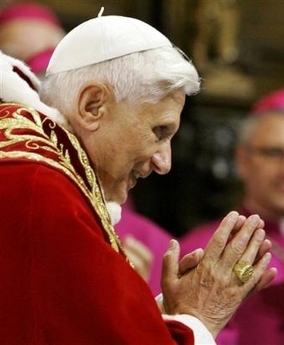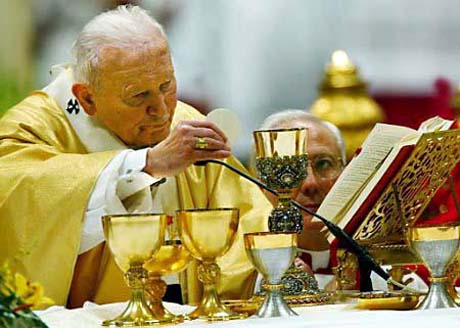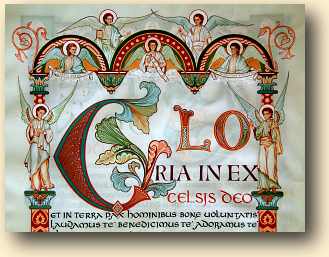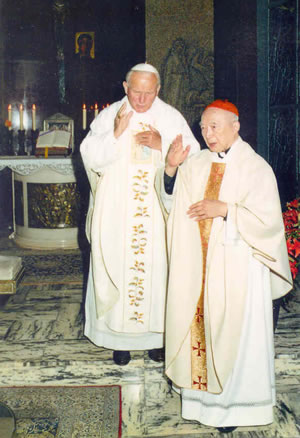From CNS, the Catholic News Service.
Pro multis means "for many," Vatican rules
Vatican, Nov. 18 (CWNews.com) - The Vatican has ruled that the phrase pro multis should be rendered as "for many" in all new translations of the Eucharistic Prayer, CWN has learned.
Although "for many" is the literal translation of the Latin phrase, the translations currently in use render the phrase as "for all." Equivalent translations (für alle; por todos; per tutti) are in use in several other languages.
Cardinal Francis Arinze (bio - news), the prefect of the Congregation for Divine Worship, has written to the heads of world's episcopal conferences, informing them of the Vatican decision. For the countries where a change in translation will be required, the cardinal's letter directs the bishops to prepare for the introduction of a new translation of the phrase in approved liturgical texts "in the next one or two years."
The translation of pro multis has been the subject of considerable debate because of the serious theological issues involved. The phrase occurs when the priest consecrates the wine, saying (in the current translation):
...It will be shed for you and for all so that sins may be forgiven.
The Latin version of the Missal, which sets the norm for the Roman liturgy, says:
...qui pro vobis et pro multis effundetur in remissionem peccatorum.
Critics of the current translation have argued, since it first appeared, that rendering pro multis as "for all" not only distorts the meaning of the Latin original, but also conveys the impression that all men are saved, regardless of their relationship with Christ and his Church. The more natural translation, "for many," more accurately suggests that while Christ's redemptive suffering makes salvation available to all, it does not follow that all men are saved.
Cardinal Arinze, in his letter to the presidents of episcopal conferences, explains the reasons for the Vatican's decision to require
- The Synoptic Gospels (Mt 26,28; Mk 14,24) make specific reference to “many” for whom the Lord is offering the Sacrifice, and this wording has been emphasized by some biblical scholars in connection with the words of the prophet Isaiah (53, 11-12). It would have been entirely possible in the Gospel texts to have said “for all” (for example, cf. Luke 12,41); instead, the formula given in the institution narrative is “for many”, and the words have been faithfully translated thus in most modern biblical versions.
- The Roman Rite in Latin has always said pro multis and never pro omnibus in the consecration of the chalice.
- The anaphoras of the various Oriental Rites, whether in Greek, Syriac, Armenian, the Slavic languages, etc., contain the verbal equivalent of the Latin pro multis in their respective languages.
- “For many” is a faithful translation of pro multis, whereas “for all” is rather an explanation of the sort that belongs properly to catechesis.
- The expression “for many”, while remaining open to the inclusion of each human person, is reflective also of the fact that this salvation is not brought about in some mechanistic way, without one’s willing or participation; rather, the believer is invited to accept in faith the gift that is being offered and to receive the supernatural life that is given to those who participate in this mystery, living it out in their lives as well so as to be numbered among the “many” to whom the text refers.
- In line with the instruction Liturgiam Authenticam, effort should be made to be more faithful to the Latin texts in the typical editions.
Ad orientem next? =)
A person can dream right?
Let's thank God for granting His people this grace and pray that the Holy Father be granted the strength to further implement the reform of the reform and free the Classical Roman Rite.
| TE DEUM laudamus: te Dominum confitemur. | O GOD, we praise Thee: we acknowledge Thee to be the Lord. |
| Te aeternum Patrem omnis terra veneratur. | Everlasting Father, all the earth doth worship Thee. |
| Tibi omnes Angeli; tibi Caeli et universae Potestates; | To Thee all the Angels, the Heavens and all the Powers, |
| Tibi Cherubim et Seraphim incessabili voce proclamant: | all the Cherubim and Seraphim, unceasingly proclaim: |
| Sanctus, Sanctus, Sanctus, Dominus Deus Sabaoth. | Holy, Holy, Holy, Lord God of Hosts! |
| Pleni sunt caeli et terra maiestatis gloriae tuae. | Heaven and earth are full of the Majesty of Thy glory. |
| Te gloriosus Apostolorum chorus, | The glorious choir of the Apostles, |
| Te Prophetarum laudabilis numerus, | the wonderful company of Prophets, |
| Te Martyrum candidatus laudat exercitus. | the white-robed army of Martyrs, praise Thee. |
| Te per orbem terrarum sancta confitetur Ecclesia, | Holy Church throughout the world doth acknowledge Thee: |
| Patrem immensae maiestatis: | the Father of infinite Majesty; |
| Venerandum tuum verum et unicum Filium; | Thy adorable, true and only Son; |
| Sanctum quoque Paraclitum Spiritum. | and the Holy Spirit, the Comforter. |
| Tu Rex gloriae, Christe. | O Christ, Thou art the King of glory! |
| Tu Patris sempiternus es Filius. | Thou art the everlasting Son of the Father. |
| Tu ad liberandum suscepturus hominem, non horruisti Virginis uterum. | Thou, having taken it upon Thyself to deliver man, didst not disdain the Virgin's womb. |
| Tu, devicto mortis aculeo, aperuisti credentibus regna caelorum. | Thou overcame the sting of death and hast opened to believers the Kingdom of Heaven. |
| Tu ad dexteram Dei sedes, in gloria Patris. | Thou sitest at the right hand of God, in the glory of the Father. |
| Iudex crederis esse venturus. | We believe that Thou shalt come to be our Judge. |
| Te ergo quaesumus, tuis famulis subveni: quos pretioso sanguine redemisti. | We beseech Thee, therefore, to help Thy servants whom Thou hast redeemed with Thy Precious Blood. |
| Aeterna fac cum sanctis tuis in gloria numerari. | Make them to be numbered with Thy Saints in everlasting glory. |
| V. Salvum fac populum tuum, Domine, et benedic hereditati tuae. | V. Save Thy people, O Lord, and bless Thine inheritance! |
| R. Et rege eos, et extolle illos usque in aeternum. | R. Govern them, and raise them up forever. |
| V. Per singulos dies benedicimus te. | V. Every day we thank Thee. |
| R. Et laudamus nomen tuum in saeculum, et in saeculum saeculi. | R. And we praise Thy Name forever, yea, forever and ever. |
| V. Dignare, Domine, die isto sine peccato nos custodire. | V. O Lord, deign to keep us from sin this day. |
| R. Miserere nostri, Domine, miserere nostri. | R. Have mercy on us, O Lord, have mercy on us. |
| V. Fiat misericordia tua, Domine, super nos, quemadmodum speravimus in te. | V. Let Thy mercy, O Lord, be upon us, for we have hoped in Thee. |
| R. In te, Domine, speravi: non confundar in aeternum. | R. O Lord, in Thee I have hoped; let me never be put to shame. |
PS
This is the letter that His Eminence Francis Cardinal Arinze sent out to the Presidents of the Episcopal Conferences:
[To their Eminences /Excellencies,
Presidents of the National Episcopal Conferences]
CONGREGATIO DE CULTU DIVINO
ET DISCIPLINA SACRAMENTORUM
Prot. n. 467/05/L
Rome, 17 October 2006
Your Eminence / Your Excellency,
In July 2005 this Congregation for the Divine Worship and the Discipline of the Sacraments, by agreement with the Congregation for the Doctrine of the Faith, wrote to all Presidents of Conferences of Bishops to ask their considered opinion regarding the translation into the various vernaculars of the expression pro multis in the formula for the consecration of the Precious Blood during the celebration of Holy Mass (ref. Prot. n. 467/05/L of 9 July 2005).
The replies received from the Bishops’ Conferences were studied by the two Congregations and a report was made to the Holy Father. At his direction, this Congregation now writes to Your Eminence / Your Excellency in the following terms:
1. A text corresponding to the words pro multis, handed down by the Church, constitutes the formula that has been in use in the Roman Rite in Latin from the earliest centuries. In the past 30 years or so, some approved vernacular texts have carried the interpretive translation “for all”, “per tutti”, or equivalents.
2. There is no doubt whatsoever regarding the validity of Masses celebrated with the use of a duly approved formula containing a formula equivalent to “for all”, as the Congregation for the Doctrine of the Faith has already declared (cf. Sacra Congregatio pro Doctrina Fidei, Declaratio de sensu tribuendo adprobationi versionum formularum sacramentalium, 25 Ianuarii 1974, AAS 66 [1974], 661). Indeed, the formula “for all” would undoubtedly correspond to a correct interpretation of the Lord’s intention expressed in the text. It is a dogma of faith that Christ died on the Cross for all men and women (cf. John 11:52; 2 Corinthians 5,14-15; Titus 2,11; 1 John 2,2).
3. There are, however, many arguments in favour of a more precise rendering of the traditional formula pro multis:
a. The Synoptic Gospels (Mt 26,28; Mk 14,24) make specific reference to “many” ([Greek word transliterated as polloin])) for whom the Lord is offering the Sacrifice, and this wording has been emphasized by some biblical scholars in connection with the words of the prophet Isaiah (53, 11-12). It would have been entirely possible in the Gospel texts to have said “for all” (for example, cf. Luke 12,41); instead, the formula given in the institution narrative is “for many”, and the words have been faithfully translated thus in most modern biblical versions.
b. The Roman Rite in Latin has always said pro multis and never pro omnibus in the consecration of the chalice.
c. The anaphoras of the various Oriental Rites, whether in Greek, Syriac, Armenian, the Slavic languages, etc., contain the verbal equivalent of the Latin pro multis in their respective languages.
d. “For many” is a faithful translation of pro multis, whereas “for all” is rather an explanation of the sort that belongs properly to catechesis.
e. The expression “for many”, while remaining open to the inclusion of each human person, is reflective also of the fact that this salvation is not brought about in some mechanistic way, without one’s willing or participation; rather, the believer is invited to accept in faith the gift that is being offered and to receive the supernatural life that is given to those who participate in this mystery, living it out in their lives as well so as to be numbered among the “many” to whom the text refers.
f. In line with the Instruction Liturgiam authenticam, effort should be made to be more faithful to the Latin texts in the typical editions.
4. The Bishops’ Conferences of those countries where the formula “for all” or its equivalent is currently in use are therefore requested to undertake the necessary catechesis of the faithful on this matter in the next one or two years to prepare them for the introduction of a precise vernacular translation of the formula pro multis (e.g, “for many”, “per molti”, etc.) in the next translation of the Roman Missal that the Bishops and the Holy See will approve for use in their country.
With the expression of my high esteem and respect, I remain, Your Eminence/Your Excellency,
Devotedly Yours in Christ,
Francis Card. Arinze
Prefect
![[Unam Sanctam]](https://blogger.googleusercontent.com/img/b/R29vZ2xl/AVvXsEiymQ2adTjpZ1ABhPBbBBquiPCxeQrc4Jy_97vOikT0wGQeJleriiXQy6ebnb0jrYe-TfvcK77txStB4aIwVAdD41ZdMkVfNtFGC0JX6LBV9B8mfeRZaIAM7Sj-011ag3DiKQzv/s1600/headerdivinemercy.jpg)

































































No comments:
Post a Comment